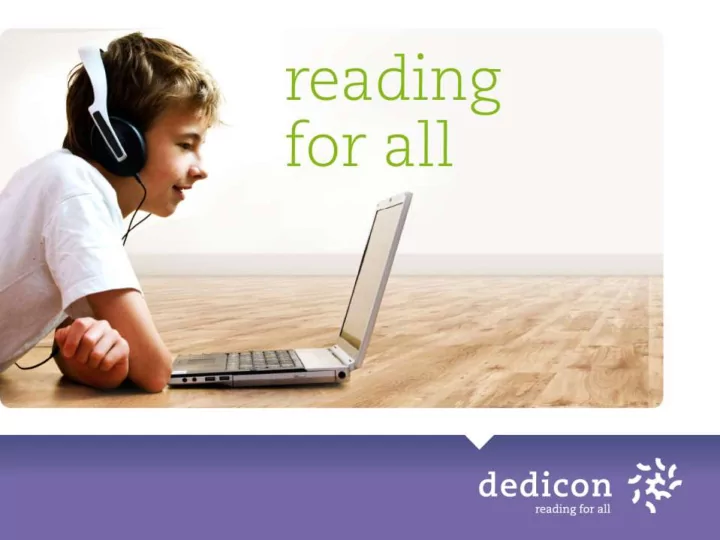

Let’s Read This One in Braille! How to make full use of the emerging eBook market for producing high quality Braille books • State of affairs at Dedicon, Netherlands By: Koen Krikhaar Senior account Specialist At DEDICON
Content of presentation • Intro to Dedicon (short) • Braille: the “traditional” way • The ebook market in the Netherlands • The central ebook platform • Gaining trust of the publishers • Changing the production chain • Not only just for making Braille • Looking ahead: the balance between exception and inclusion
Short Intro to Dedicon Mission: Inhoudsopgave • Onderwerp Making information • Onderwerp accessible for • Onderwerp • Onderwerp people with a print impairment.
For all kinds of reading disabilities
Core Activities • Producing • Distributing • Innovating • Supporting
Services and Products • Dedicon has two main branches – Library services (backoffice for 30,000 people / + public libraries) – Educational services (service to 8800 students and 3500 schools)
Innovating services • Implementing Daisy Online Delivery Protocol • Reading on Mobile platforms (Apps) • Developing synthetic voices and T2S products • Production tools for creating Daisy XML/ ePub3 formats • Multimedia forms of reading ( karaoke reading ) • Crossborder sharing (e.g. in ABC/ Tigar) • Testing new products and ways of reading (proefportaal.nl)
Braille: the “traditional” way • Printed books are bought, cut and scanned • PDF files are stored • If Braille is requested, we start OCR • PDF + OCR is send to production house in India • XML is marked up according to our Daisy 3.0 specs • Daisy XML is send back to Dedicon • Last corrections and validation at Dedicon • Creating Print File by automatic dynamic conversion • Storing Daisy Masterfile + Braille Print File
The ebook market in the Netherlands • 30.000 titles as eBook (37% of all titles on sale) • 140 web stores that sell eBooks • 7 eBook ecosystems, such as Kobo, Google and iBooks. • 1.1 million eReaders + 5 million tablets are in use • The total sale of eBooks is around a growing 4% of all booksales. (within online sales it is 22%) • Public Libraries have a growing 5000 eBooks on loan • The total number of new eBooks on the Dutch market is estimated to be around 10.000 titles a year.
The central ebook platform (CB online) Publishers • Ebook files • Metadata • Price • Contracts
Gaining trust of the publishers • Backing of the Dutch Publishers Association (NUV) We are changing the production chain (not the products) All is still subject to the collective agreement • Individual publishers still need to give permission to CB online (for their open eBook files to reach Dedicon) • Targetting the 3 largest Dutch publishing houses • Developed a contract with one of them (VBK) , might be model for others We are not in business of retailing (selling) the eBooks We have secure servers We distribute only among our target group We confrom to the collective agreement
innovating the production chain • Using unprotected (naked) eBook files is a great step forward (both in quality and in speed of delivery) Developing scripts to convert the ePub2/3 to Daisy XML From Daisy XML to braille is standard procedure • Looking for ways to make this more efficient, (e.g. by converting from ePub3 directly into Braille) • Looking for ways to turn it into an end-user driven ordering system (Lets read this one in Braille!) • International cooperation Nordic libraries + SBS are developing a special set of ePub3 to accomplish this The Daisy Consortium is propelling the TIES program ( Transition to Inclusive EPUB 3 Ecosystem)
Not only for better Braille books! • The ePub / ebook files can be used for other adapted formats ➙ TTS versions ➙ Giant print editions ➙ Multimedia version • Communication with publishers remains a central issue • SIOB and Dedicon will negotiate a new collective agreement in the fall
Striking a balance between exception and inclusion • Focus should be on the whole ecosystem of reading • Printed and electronic Braille-files will stay a special service under the exception • Reading of eBooks might indeed become inclusive Can the end-user read the commercially available eBook? How can we as special libraries be instrumental in this? • It might be wise for us special service providers to start thinking more about truly inclusive services and how to bring them about
Tack för er uppmärksamhet
Recommend
More recommend